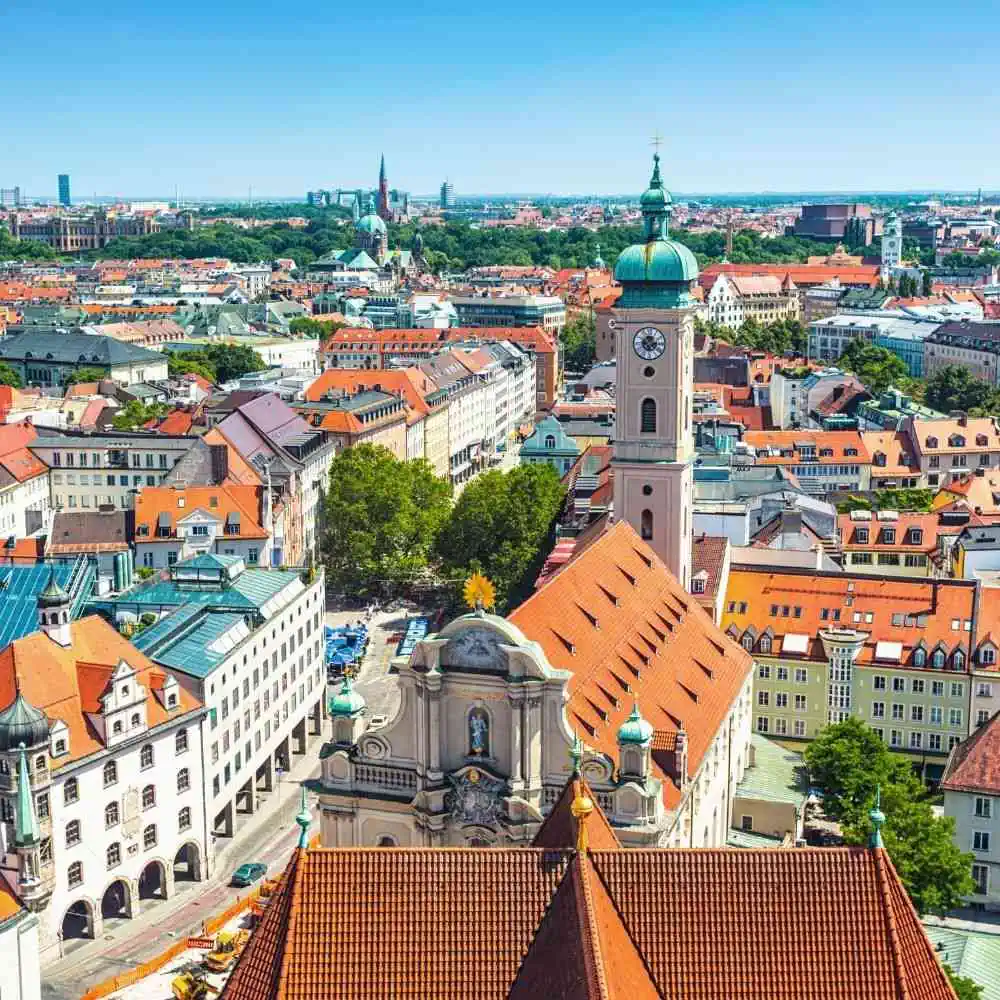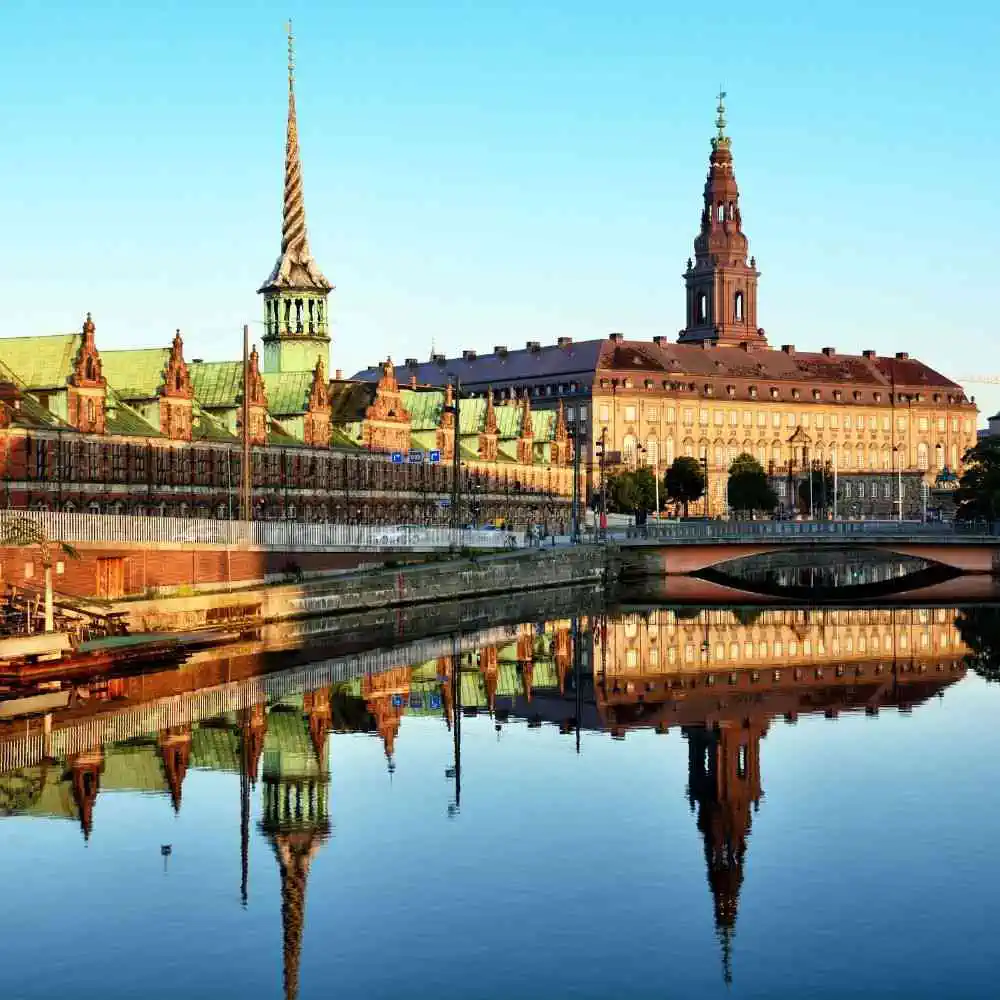You will depart from Kobenhavn, located right in the city center of Copenhagen, and enjoy the beautiful scenery of the journey while you arrive in Munchen Hbf, also located in the heart of Munich.
Trains from Copenhagen to Munichfrom € 100.00
Trains from Copenhagen to Munich
Travelling by train: Copenhagen - Munich
Exploring Europe by Train: A Copenhagen to Munich Journey!
Dreaming of exploring Europe? A train journey from Copenhagen to Munich could be the perfect way to do it.
This highly scenic and convenient trip takes you across Denmark, Germany, and Austria, giving you the opportunity to explore some of Europe’s most iconic cities.
The total trip duration is approximately 8 hours and 20 minutes, depending on which routes and connections you take. The total distance of the journey is 840 km.
The main stations in Copenhagen are Copenhagen Airport, Central Station, and Nørreport Station. You can change trains in Hamburg and Nuremberg or Passau, depending on the route you take. The main station in Munich is called Munich (Hbf) Central Station.
Along the way, you will pass through some of Europe’s most beautiful cities and towns, including Aalborg, Flensburg, Hamburg, Nuremberg, Passau, and Augsburg. During the departure and arrival, you will be able to find some of the most iconic items in European culture, such as Danish pastries, sausages, German beer, and Teutonic castles.
With affordable prices and a convenient trip, taking a train from Copenhagen to Munich is a great way to explore Europe. Whether you are looking to explore some of the most iconic cities and towns or find some of Europe’s most iconic items, this journey has it all.
So why wait? Book your trip today and explore Europe in one of the most convenient and beautiful ways possible!

Journey details
How long does that train from Copenhagen to Munich take?
The average train journey from Copenhagen, Denmark to Munich, Germany takes approximately 11 hours. However, durations can vary depending on specific connections and waiting times.
What is the fastest journey from Copenhagen to Munich by train?
The fastest train journey from Copenhagen to Munich can take about 10 hours when utilizing optimal connections and limited stops along the route.
How much does the train cost from Copenhagen to Munich?
The cost for a train ticket from Copenhagen to Munich varies, starting from €60 for early bookings and off-peak times. Prices can increase closer to the departure date or during peak travel seasons.
How much does the Copenhagen to Munich?
No, there are no direct train services from Copenhagen to Munich. Passengers typically need to make at least one change, often in cities like Hamburg or Frankfurt.
What is the distance from Copenhagen to Munich by train?
The distance from Copenhagen to Munich by train is approximately 950 Km. This can vary slightly depending on the specific route and train service used.
Which are the cities that the train stops from Copenhagen to Munich?
On the journey from Copenhagen to Munich, the train may stop in several key cities, including Hamburg, Hanover, and Nuremberg. The exact stops can depend on the train route and service chosen.
Copenhagen: Places to see
Welcome to Copenhagen, Denmark! Nestled between Sweden and Germany, this vibrant capital city is full of history, culture, and delicious cuisine. From the stunning architecture of the awe-inspiring Rosenborg Castle to the picturesque views of the harbor, Copenhagen is the perfect destination for an unforgettable getaway. Here are seven must-visit historical and architectural sites for your next trip to Copenhagen.
Rosenborg Castle: Built by King Christian IV in the early 17th century, Rosenborg Castle is a stunning example of Renaissance architecture. Located in the heart of Copenhagen, you can wander the royal chambers, explore the king’s collections, and marvel at the lush gardens. Best of all, entrance to the castle is free.
Amalienborg Palace: Amalienborg Palace is the official residence of the Danish royal family. Boasting four identical palaces, the complex also houses a chapel, an equestrian statue of King Frederik V, and the royal guard musketeers. The view of the palace from the water is particularly stunning.
Christiansborg Palace: As the seat of the Danish Parliament, Christiansborg Palace is a trove of Danish history. Stroll through the castle and admire the intricate architecture, and don’t miss the royal stables and the royal library. Consider a guided tour for more in-depth insights.
Tivoli Gardens: Head to the lovely Tivoli Gardens for a day of family fun. Catch a show or enjoy the rides, and don’t miss the lush gardens and live music events. Be sure to indulge in some classic Danish food, like smørrebrød, or Danish open sandwiches.
Strøget: Strøget is a main shopping district in Copenhagen, featuring both high-end designer boutiques and cozy independent stores. Take a stroll down the cobblestone streets and explore the glittering shops and vibrant cafes.
The Round Tower: Built in 1642, the Round Tower is the oldest functioning observatory in Europe. Climb the winding walkway to the top of the tower and take in the breathtaking views of Copenhagen.
Nyhavn: Nyhavn is a colorful waterfront district, boasting both alfresco dining and charming canal-side bars. Don't miss the popular Nyhavn market, where you can find everything from traditional crafts to handmade jewelry.
From palaces to parks, Copenhagen offers something for everyone. With its stunning architecture and vibrant culture, you're sure to have an unforgettable stay in this magical city.

Munich: Places to see
Munich (München), in Germany is a fascinating destination that offers visitors a blend of city delights, lively culture, and rich historical and architectural gems to explore. From soaring cathedrals to beautiful parks to world-famous beer halls, there is something for everyone in this Bavarian city. Here is a list of seven must-visit sites while in Munich, including information on each spot’s historical and architectural significance, practical details, and insider tips.
Nymphenburg Palace: The grand Baroque palace, built for Elector Ferdinand Maria in 1664, is now a museum featuring beautiful galleries and gardens. Located in the western section of Munich, it is a great spot for a leisurely stroll. Entrance is €12.50 and it’s open until 6 pm. Take a guided tour to learn more about its history.
Hofbräuhaus: This legendary beer hall has been around since 1589, and remains one of the most iconic spots in Munich. Here, visitors can sample the city’s famous Bavarian beer while enjoying traditional Bavarian dishes. Prices are quite reasonable and its open until at least 11 pm. Come early to avoid the crowds and find a good seat.
Marienplatz and City Hall: Located in the heart of the city, Marienplatz is one of Munich’s most iconic squares. The Old City Hall (Altes Rathaus) here is a magnificent Gothic building, while the New City Hall (Neues Rathaus) boasts a unique Neo-Gothic exterior. Free to visit. Catch the famous Glockenspiel at the New City Hall at 11 am or 12 pm.
English Garden: This large public park is a haven of nature and tranquillity in Munich. Spanning an area of more than 920 acres, it’s a great spot for a relaxing walk or a picnic. It also features a beer garden. Free to visit. Take a boat ride along the lake for the perfect romantic evening.
Frauenkirche and St. Peters Church: Located on Munich’s central pedestrianised street, these two churches are important landmarks that offer visitors a glimpse of the city’s religious traditions. Frauenkirche is an impressive Gothic building, while St. Peters is a more modern structure. Free to visit. Look out for the beautiful stained glass windows inside.
BMW Museum: Learn all about the famous German carmaker at this factual and educational museum in Munich. Visitors get a comprehensive overview of the company’s history, as well as a chance to explore some of its iconic cars. Entrance is €12 and the museum is open until 8 pm. Book a guided tour to get the full experience.
Viktualienmarkt: This colorful, traditional food market is the perfect place to sample some of Munich’s local specialties. Here, visitors can find Bavarian sausages, freshly baked pretzels, cheeses, cakes, and plenty of other delicious treats. Free to visit. Stop by on a Sunday morning to experience the market in all its glory.
A trip to Munich provides a wealth of experiences for travelers, from beer halls to old churches to fascinating museums. Whether you’re looking for a cultural exploration or a romantic getaway, the city’s diverse offerings guarantee an enjoyable time.

Copenhagen: Main train stations
Copenhagen, the capital of Denmark, has an important and modern train station. The main train station is called Copenhagen Central Station (København H). It is located in the heart of the city and allows access to other towns and cities in Denmark. In addition to the main station, there are three other strategically located train stations in the city, such as Copenhagen Airport, Østerport Station and Nørreport Station.
The Copenhagen Central Station has several useful services. It is open 24 hours and it has an information desk and ticketing services. The address is Bernstorffsgade 16, 1570 København V. For additional information, they can be contacted by phone at +45 7013 1415. Baggage storage is also available.
- Kobenhavn
- Buddinge St.
- Gentofte St.
- Enghave St.
- Stengaarden St.
Munich: Main train stations
Munich, in Germany is home to the country's largest train station, München Hauptbahnhof. Connecting the city to over 150 destinations and serving as many as 450,000 passengers a day, it is the busiest train station in Germany. There are also other important train stations in Munich such as München Ost, München Pasing or München Laim.
München Hauptbahnhof is situated at Bayerstrasse 10a-c, 80335 Munich. It is open 24 hours a day, 7 days a week. There are several services available, including luggage storage and a staffed information desk. The station can be reached by car and public transport such as S-Bahn, U-Bahn and buses, and is located near the city center, allowing passengers to reach popular tourist attractions easily.
- Munchen Hbf
- Munchen Ost
- Munchen-Pasing
- Munchen Hackerbrucke
Copenhagen - Munich: How to get the best deals
Book in Advance:
Just like with airfares, train ticket prices tend to rise as the departure date gets closer. Booking weeks or even months in advance can save you a significant amount.
Travel During Off-Peak Hours:
Avoid traveling during peak times such as weekday mornings and evenings. Opt for midday, late evening, or mid-week rides when there's less demand.
Consider Slower Trains or non direct routes:
Express or high-speed trains might save time, but they're often pricier. Opting for regional or slower services can reduce your fare.
Look for Special Deals and Promotions:
Train operators occasionally have promotions or special deals, especially during off-peak seasons. It's worth signing up for newsletters. Additionally, there are sometimes group or return ticket discounts, so consider these options if they fit your travel plans.
- Contact Us


